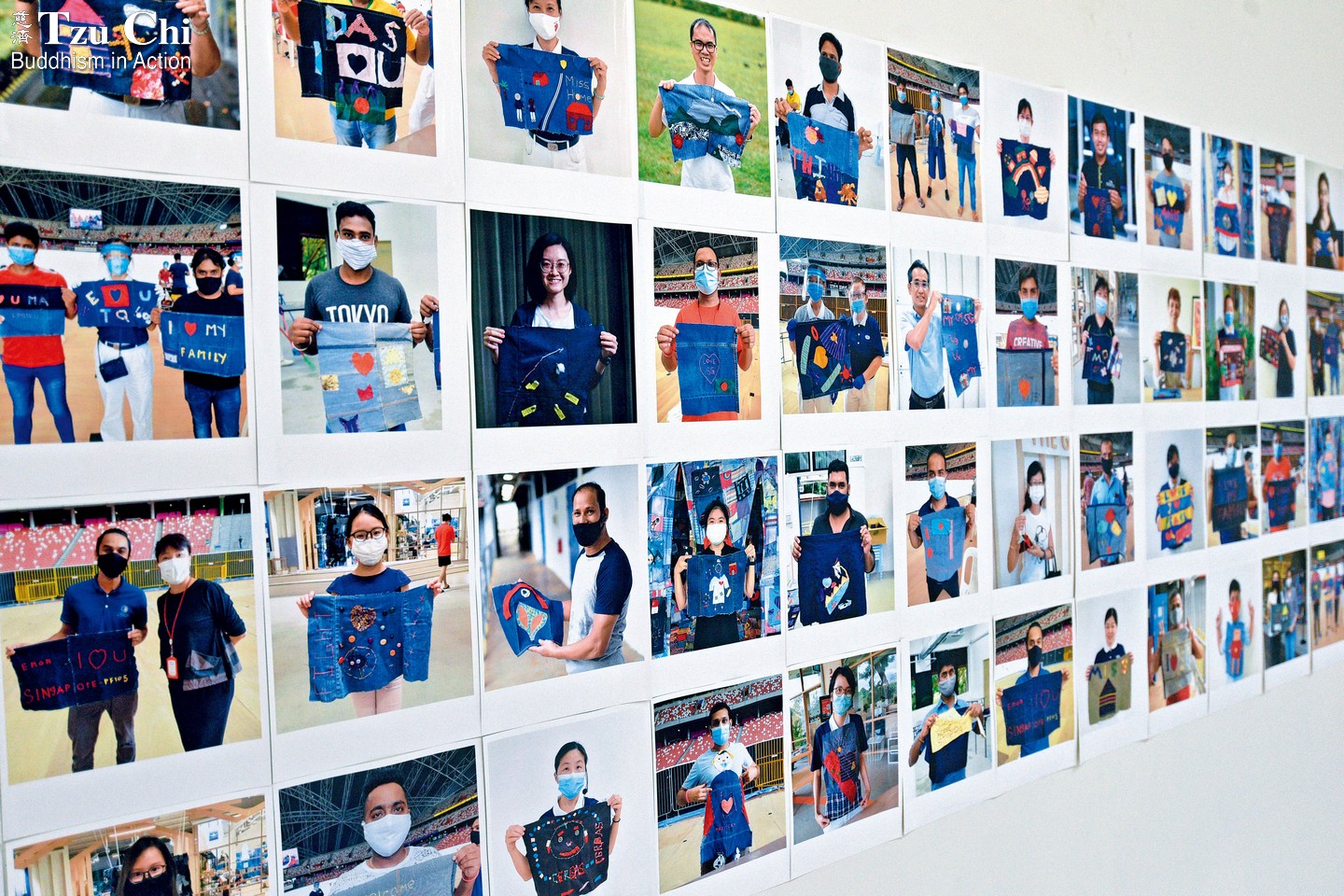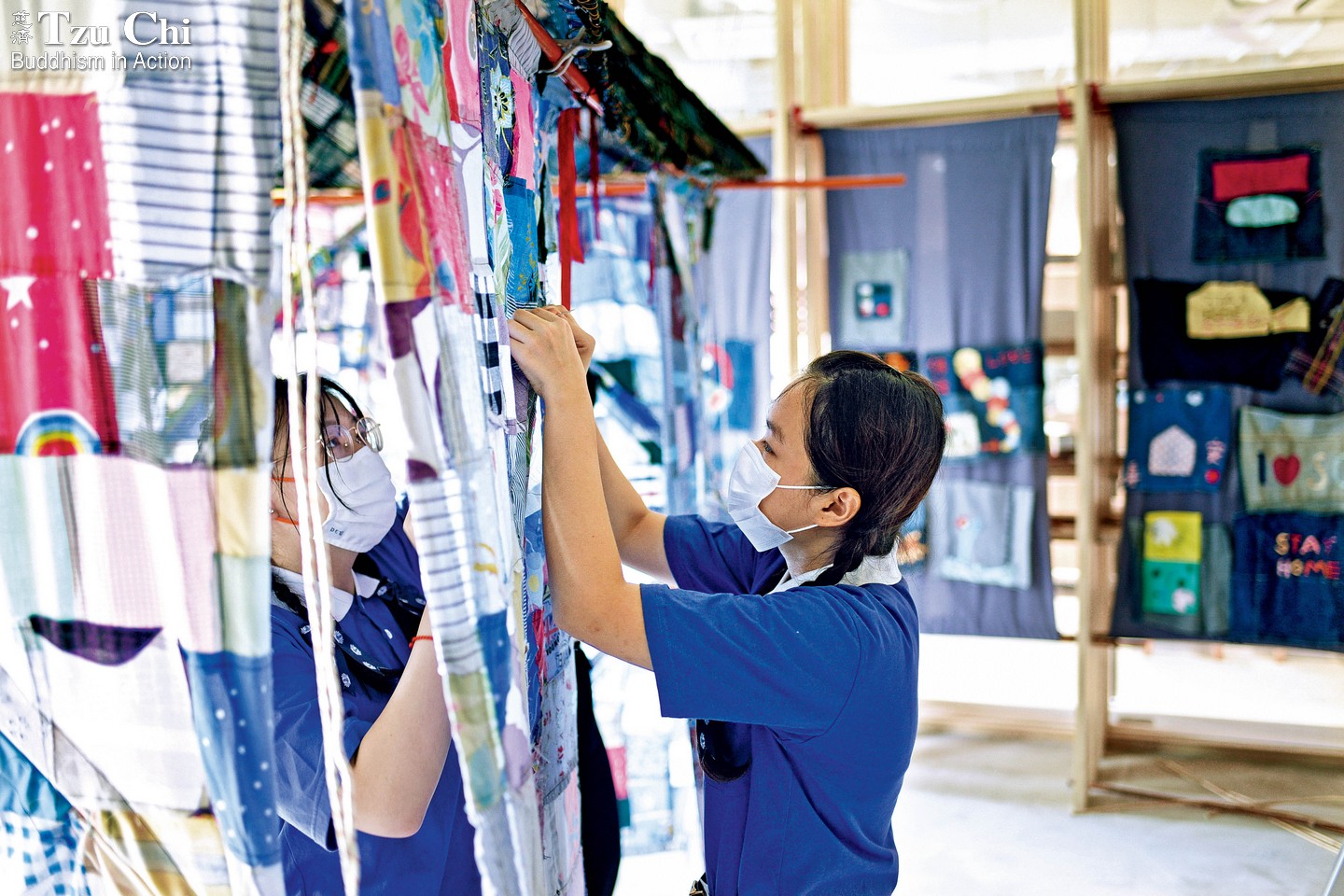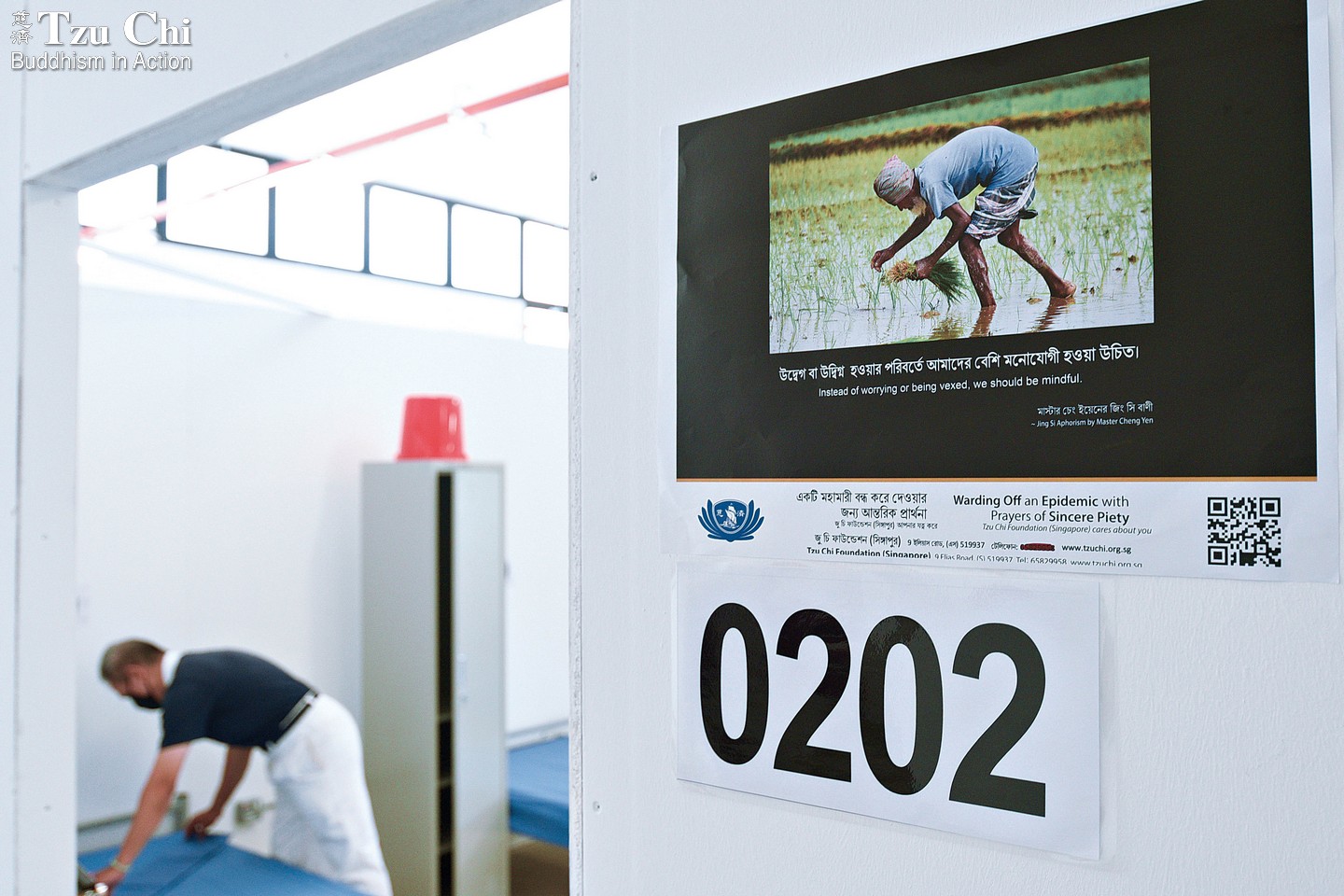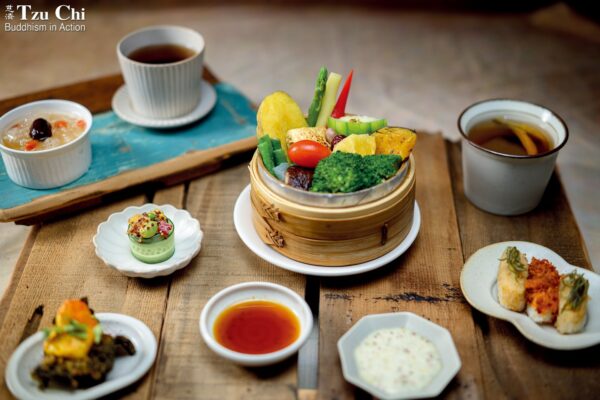By Zhang Yu-fan
Translated by Tang Yau-yang
Photos courtesy of Tzu Chi Singapore
Of the more than 60,000 people confirmed to have contracted COVID-19 in Singapore, 90 percent have been migrant workers. The services of these workers are vital to many sectors in the Singaporean economy. In response, the government has offered them testing and treatment, in addition to enforcing a quarantine to contain the spread of the virus. Tzu Chi has done what it can to help these foreign workers weather this viral storm.

Tzu Chi Singapore held an exhibition in November 2020 featuring fabric works created by migrant workers and others under a project called “Stay Home Quilt.”
In its Asia-Pacific Migration Report 2020, the United Nations Economic and Social Commission for Asia and the Pacific called on countries to include migrant workers in their COVID-19 vaccination plans. Such persons are exposed to a higher risk of infection. The rights of migrant workers, with their relatively disadvantaged situations, call for special attention in a crisis like the pandemic.
Singapore, known for its world-leading economic competitiveness, is one of the countries that has reported COVID-19 cluster infections among migrant workers. After the coronavirus emerged in the country in January 2020, the government used technology to help tackle the pandemic. For example, they launched digital tools such as TraceTogether App/Token and SafeEntry to facilitate contact tracing. Though the efficiency of such tracking systems was highly praised by epidemiologists from Harvard University, large-scale cluster infections began popping up at the end of March. Most of these were in dormitories housing foreign workers. The government quickly implemented a “circuit breaker” response, a measure similar to a lockdown. The order required people to stay home for work or schooling, dine-in meals were forbidden, and more than 300,000 migrant workers in the nation were tested or quarantined.
The government’s quick response successfully brought the outbreaks under control. In fact, the country did so well that Bloomberg News ranked Singapore the world’s best in weathering COVID-19. That was on April 25, 2021. But soon thereafter, in May, the country experienced a spike in community cases, prompting the government once again to tighten its control measures, including those at dormitories for migrant workers.
On May 17, less than two weeks after the tighter restrictions were imposed, the Tzu Chi Humanistic Youth Centre received a phone call from an official at the government’s Ministry of Manpower. The official expressed hope that Tzu Chi could resume their care for migrant workers through programs similar to the “Stay Home Quilt” carried out last year. That program was designed to enhance the emotional well-being of migrant workers. The official hoped that Tzu Chi could come through again for these essential workers and help them through the challenges of COVID-19.

Participants of the “Stay Home Quilt” project work at the Tzu Chi Humanistic Youth Centre to create an art piece in the shape of a house.
Doing the right thing
After the outbreak of infections among migrant workers last year, the government provided them with treatment expenses, quarantine facilities, and food. They even requested that employers continue paying salaries to their foreign workers diagnosed with the disease, then subsidized the employers for the payment.
But even after the outbreak was successfully contained and the government had eased its preventive measures for most of the city-state, the country’s migrant laborers still faced strict movement restrictions. They remained mostly confined to their dorms, with meals delivered to the doors of their dorm rooms. Once every few months, their employers would charter vehicles to take them to locations designated by the government. There they could buy daily necessities, wire money home, or do other activities. Other than that, they could leave home only for work. This way of life certainly wouldn’t be considered free, but they were happy just to leave their rooms and get fresh air.
To help migrant workers through this difficult time, Tzu Chi joined a collective effort to care for them. Volunteers made and donated cloth masks to them, spruced up an isolation facility for infected workers, and prepared daily necessities for the workers. Working with other organizations, they also launched an art project called “Stay Home Quilt” and encouraged migrant workers to join in. Each participant received a sewing kit from the Tzu Chi Humanistic Youth Centre to create any patterns on a piece of recycled fabric. Participants were encouraged to express their emotions and creativity through the act of sewing.
Later, Tzu Chi Singapore invited foreign workers who participated in the project to donate their fabric artwork. Local artist Jimmy Ong (王文清) then consolidated the artwork with similar creations made by members of the public into a work of art symbolizing “home.” This work and other fabric artwork created under the project were put on display at the Tzu Chi Humanistic Youth Centre for the public to view. The exhibition attracted a lot of attention and struck a chord with many who attended it.
Lim Choon Choon (林杏純), manager of the Tzu Chi Humanistic Youth Centre, pointed out that the art project had used large amounts of recycled materials, such as fabrics and buttons, that had been obtained from used clothes found at Tzu Chi recycling stations. The recycled materials were given new life in the project and became a medium through which the underprivileged could share their stories and give vent to their pent-up emotions.
At the request of the Ministry of Manpower in May this year to offer a similar service, Tzu Chi Singapore decided to join hands with other NGOs again to reach out to foreign workers. They planned to organize on-line forums, art workshops, and sewing and poetry reading activities as a way to care for their social and emotional well-being.
The Tzu Chi Singapore branch also sought permission from the Migrant Workers’ Centre during the pandemic to have Tzu Chi volunteers visit migrant workers and organize stress-relieving activities at their dormitories. “Except for my roommates, you are the first person I have seen in the past four months!” That was the first sentence that an Indian worker said to Lim Choon Choon when the latter visited a migrant workers’ dormitory. Lim still remembered how emotional the worker was, the sight of which made her eyes well up. She said that she teared up not just from seeing the worker’s unfiltered helplessness but also because “I felt I’d done the right thing by visiting the dormitory.”
Singapore suffered tens of thousands of COVID-19 infections after the pandemic hit over a year ago. Between 80 and 90 percent of those infections were from foreign laborers. The Tzu Chi volunteers visiting migrant workers’ dormitories were thus understandably worried about the possibility of becoming infected themselves. Some volunteers wore four masks under a protective face shield to avoid infection, and others refrained from going to the restroom for up to five hours.
“Even with all the precautionary measures, I still couldn’t be sure whether I had escaped being infected,” Lim said. In fact, none of the volunteers could be certain, but it was their action in the face of that uncertainty that moved Lim the most. Despite their fears, volunteers bravely visited the dormitories just to send a little warmth to those helpless workers.

A volunteer makes a bed at an isolation facility for infected workers. Volunteers also pasted posters carrying aphorisms by Dharma Master Cheng Yen on walls in the facility. Wang Sui Xi
Apart but not alone
The pandemic also impacted how Tzu Chi Singapore helped needy households receiving long-term aid from the foundation. The “circuit breaker” lockdown went into effect in April 2020 and wasn’t gradually relaxed until early June 2020. Tzu Chi volunteers during that period had to suspend their regular monthly visits to needy families, among which were more than a hundred households consisting of older people living alone or living with other older people. Unable to visit in person, volunteers telephoned these seniors frequently to check on them. The conversations revealed that many older people couldn’t obtain personal protective supplies. As a result, they were reusing face masks repeatedly. Volunteers responded by preparing gift packs for them containing masks, hand sanitizer, and dry food. Volunteers also attended to the special needs of some families by donating wheelchairs or baby essentials to them.
All items intended for the needy during the “circuit breaker” period were delivered by aid recipients and Tzu Chi volunteers who worked as taxi drivers and whose incomes had been adversely affected by COVID-19. Tzu Chi Singapore initiated a work relief program by engaging the services of the volunteers and aid recipients. The program provided a win-win-win solution: the drivers delivered precious supplies and earned a little money, the foundation achieved its goal of getting supplies to needy families, and recipients received things to help them along.
Despite restrictions during the pandemic, volunteers did their best to help the vulnerable. Goh Leay Ying (吳麗瑩), deputy manager of the Tzu Chi Charity Development Department, shared a story about a family under Tzu Chi’s long-term care that had happened earlier during the pandemic. A middle-aged woman would not leave her home in fear of becoming infected outside and bringing the disease inside to her bedridden husband, whose immune system had been weakened. But staying within the confines of their home all the time, day after day, had taken a toll on her. At times, she would shout from a window at home at the top of her lungs to let out her pent-up stress from being housebound. When a Tzu Chi volunteer called her to extend care and check on her, she told the volunteer that she had not eaten bread in the longest time. That very evening, another volunteer who lived in the same community brought a loaf of bread to her and left it at her door.
Afterwards, the woman called the volunteer who had delivered the bread to her and thanked her. The volunteer could tell from the voice on the phone that the woman was quite ecstatic. Goh said, “Bread is something easily obtainable for us, but for the woman, it was like timely rain and a great blessing from heaven.” She added that though the pandemic had blocked some of the usual interpersonal connections, it also fostered a sense of gratitude for some of the smaller pleasures in life. Things which might have been taken for granted before—a loaf of bread, for example—now were a cause to be cheerful and thankful.
Looking Back on the Critical Year
By Lim Choon Choon, manager of the Tzu Chi Humanistic Youth Centre Compiled by Pang Lun Peng
When people needed face masks, we sewed masks for them. We had planned to make 500, but we ended up making 50,000. When infections spiked in the dormitories of foreign workers, we went there to offer care. What society needed, we delivered.
Whatever your nationality or ethnicity, we live together in Singapore, so together we shall plow ahead through the pandemic. This past year was a challenging one, but for me it was also a fulfilling year replete with positive thoughts, optimism, and gratitude.



